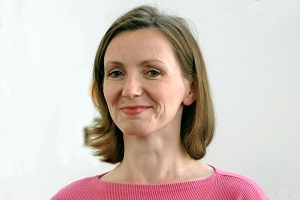Man Booker Prize voor Anna Burns
De Man Booker Prize, de belangrijkste prijs voor Engelstalige literatuur, gaat dit jaar naar de Noord-Ierse schrijfster Anna Burns. Ze krijgt de onderscheiding voor haar roman “Milkman”, die speelt in het Noord-Ierland van de jaren 70. Zie ook alle tags voor Anna Burns op dit blog.
Uit: Milkman
“Third time of the millanan was when he appeared not long after my adult evening French class. This dass was downtown and it had surprising things. Often these would not be French things. Often too, there would be more of Litern than would be the French things. At this latest lesson, which took place on Wednes-day evening, teacher was reading from a book. This was a French book, a proper French book — one that native speakers cottld read without considering it beneath them — and wacher said she was reading from it to get us used to what authentic French sounded like when strung together in Full-on passages — in this rase, a lit-erary passage. Thing was though, the sky in this passage she was reading from wasn’t blue. Eventually she got interrupted because someone in the dass — spokesperson for the test of us — naturally couldn’t stand it. Something was wrong and he had a need, for the sake of all things generic, to point it out. ‘1’m confused,’ he said. ‘1s that passage akut the sky? lf it is about the sky then why doesn’t the writer just say so? Why is he complicating things with fang footwork when all he need say is that the sky is blue?’ ‘Hear! Hear!’ cried us oti if some of us, like me, didn’t cry it, certainly we agreed in sentiment. ‘Le ciel est bleu! Le ciel est bleu!’ shouted many of the others. ‘That would have deared matten. Why didn’t he just put that?’ We were disturbed, and not a little, but wacher, she laughed which was something she did a lot. She did this because she had an unnerving amount of humour — another thing which ruffled us as well. Whenever she laughed, we weren’t sure whether to laugh along with her to be curious and engaged and to ask why she was laughing, or to be sulky and offended and seriously up in ums. This time, as usual, we opted for up in arms. ‘What a waste of time and a confusion of subjects; complained a woman. ‘That writer ought not to be featuring in a French lesson even if he is French if he’s not doing anything about teaching it. This is”learning a foreign language” dass, not a dass on burdening us with taking things apart which are in the saure language to find out if they’re a poem or something. If we wanted figttres of speech and rhetorical flourishes, with one thing representing another thing when the represented thing could easily have been itself in the first place, then we’d have gone to English Literature with Chose weirdos down the hall.”Yeah!’ cried us and also we cried, ‘A spade’s a spade!’, also the popular ‘JA ciel est Neurand ‘What’s ihe point? There’s no point!’ continued to come out of us. Everyone was nodding and slapping desks and murmuring and acclaiming. And now it was time, we thought, to give our spokespeople and ourselves a jolly good round of applause. ‘So, dass,’ said wacher after this applause had diel down, ‘is it that you think the sky can only be blue?’ The sky is blue,’ warne us. ‘What colour eise can it be?’
Anna Burns (Belfast, 1962)

